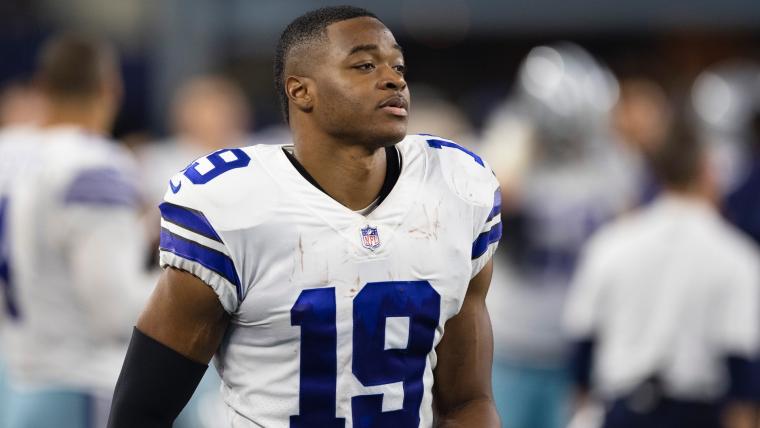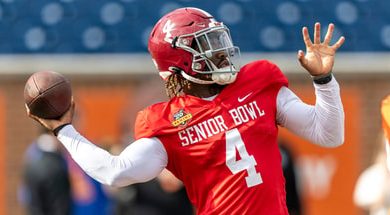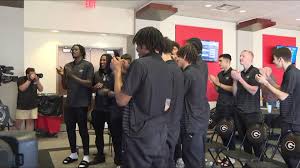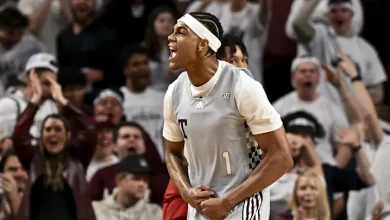Will the Cowboys sign Amari Cooper once more? Why the rumors don’t seem to be true

Will the Dallas Cowboys Sign Amari Cooper Once More? Why the Rumors Don’t Seem to Be True
In the world of the NFL, rumors and speculation about player movements are as much a part of the off-season as training camps and preseason games. Over the years, the Dallas Cowboys have been a team that garners a significant amount of media attention, particularly when it comes to player transactions, especially concerning high-profile athletes like wide receiver Amari Cooper. The prospect of the Cowboys potentially re-signing Cooper has been a topic of discussion for many fans and analysts, with some expressing hope that the team will bring back the star receiver who played a significant role in their offense for several seasons.
However, despite the swirling rumors, the notion that the Cowboys are seriously considering re-signing Cooper does not seem to hold much weight. In this article, we will examine why the chances of the Cowboys re-signing Cooper are unlikely, diving into several key factors, including their current roster, salary cap situation, and the team’s overall direction. Furthermore, we will analyze the dynamics of Cooper’s departure from the team and why the Cowboys’ decision to move on from him may be a prudent one in the long term.
1. Amari Cooper’s Departure and the Cowboys’ Decision
Amari Cooper joined the Dallas Cowboys in a midseason trade in 2018, coming from the Oakland Raiders in exchange for a first-round pick. At the time, Cooper was considered one of the most talented wide receivers in the NFL, and his acquisition was viewed as a major move to bolster the Cowboys’ offense. Cooper immediately made an impact in Dallas, providing quarterback Dak Prescott with a reliable target and helping elevate the passing game.
However, over the course of his tenure in Dallas, several factors contributed to the eventual decision to move on from Cooper. While Cooper’s individual performance remained solid, the Cowboys faced increasing difficulties in managing his contract. Cooper had an expensive deal, and the Cowboys found themselves in a situation where his cap hit was a significant burden on the team’s salary cap. In March 2022, the Cowboys made the difficult decision to trade Cooper to the Cleveland Browns in exchange for a fifth-round pick and a swap of sixth-round picks.
The move was met with mixed reactions. On one hand, Cooper had been one of the Cowboys’ most consistent and productive receivers during his time with the team, earning Pro Bowl selections and providing Prescott with a dynamic weapon. On the other hand, the Cowboys were facing salary cap constraints, and Cooper’s contract was one of the larger obligations on the books. The decision to part ways with him was ultimately seen as a financial move, with the Cowboys looking to free up cap space to address other needs on the roster.
2. The Cowboys’ Current Roster and Wide Receiver Situation
When evaluating whether the Cowboys would re-sign Cooper, it is important to first consider the team’s current wide receiver situation. Since Cooper’s departure in 2022, the Cowboys have made several moves to solidify their receiving corps. Most notably, they selected wide receiver CeeDee Lamb in the first round of the 2020 NFL Draft, and Lamb has quickly developed into the team’s number-one receiver. Lamb’s breakout performances have proven his ability to be a true number-one option in the passing game, and he has formed a strong connection with quarterback Dak Prescott.
In addition to Lamb, the Cowboys have bolstered their receiver room with a number of complementary players. Michael Gallup, who had been a key contributor alongside Cooper, has continued to provide solid production, even coming off an ACL injury. Gallup has shown flashes of his former self and remains an important piece of the Cowboys’ offense. The Cowboys also added veteran receiver Brandin Cooks in a trade with the Houston Texans before the 2023 season. Cooks, known for his speed and deep threat ability, brings an additional layer of versatility to the Cowboys’ receiving corps.
With Lamb, Gallup, and Cooks, the Cowboys already have a solid trio of wide receivers who provide a diverse skill set. Lamb is the primary target in the passing game, capable of both making big plays and operating as a reliable possession receiver. Gallup provides a deep-threat presence, while Cooks brings veteran savvy and explosive speed. With these three players, the Cowboys have a well-rounded receiver room that offers Dak Prescott a wide range of options in the passing game.
Given this depth at the position, it seems unlikely that the Cowboys would prioritize bringing back Amari Cooper. Cooper, while a talented receiver, would not be a necessity for the Cowboys’ offense, given that they already have three strong options. Adding another high-priced wide receiver could potentially upset the balance of the team’s roster, particularly when the Cowboys have other positions of need.
3. Salary Cap Considerations and Financial Constraints
One of the most significant reasons why the Cowboys are unlikely to re-sign Amari Cooper is their current salary cap situation. The NFL salary cap is a complex system, and teams must be strategic in how they allocate their resources. In recent years, the Cowboys have made several moves to manage their cap space, including restructuring contracts and making tough decisions to let players go in order to maintain financial flexibility.
As of 2025, the Cowboys are still working with a relatively tight salary cap. They have invested heavily in several key players, including quarterback Dak Prescott, defensive stars such as Micah Parsons and Trevon Diggs, and offensive linemen like Tyron Smith and Zack Martin. While the Cowboys have managed to keep their roster competitive, there is little room for a significant addition without some restructuring or cutting elsewhere.
Bringing back a high-priced player like Amari Cooper would be a difficult proposition financially. Cooper is still an effective receiver, but his contract with the Cleveland Browns is a sizable one. The Cowboys would have to make substantial moves to create cap space if they wanted to fit Cooper’s contract into their budget. Moreover, with their other pressing needs, including potential extensions for key players and strengthening areas such as the defensive line or secondary, the Cowboys cannot afford to tie up a large portion of their cap space in a wide receiver who would only be a supplementary piece to their already solid receiving corps.
4. The Cowboys’ Focus on Building a Balanced Team
Another important consideration when assessing the possibility of the Cowboys re-signing Cooper is the team’s overall strategy in recent seasons. Under head coach Mike McCarthy and general manager Jerry Jones, the Cowboys have increasingly focused on building a balanced and complete roster, rather than overloading any one position group with high-priced players. While wide receiver is an important position, the Cowboys have placed greater emphasis on strengthening the defense, building depth along the offensive line, and investing in other key areas such as the running back position and quarterback.
In 2025, the Cowboys are in the midst of a window where they need to focus on team-wide improvements rather than splurging on individual stars. While Cooper would undoubtedly provide additional talent at the receiver position, the Cowboys’ offense is already in good hands with CeeDee Lamb, Michael Gallup, and Brandin Cooks. Given the strength of the defense and the offensive line, the Cowboys are looking to maximize their roster by spreading resources more effectively across multiple positions, rather than investing a large sum in another wide receiver.
Moreover, the Cowboys have historically been a team that prioritizes maintaining flexibility in their roster, and bringing back a high-priced player like Cooper would limit that flexibility. The team is looking to keep its options open for the future, especially as they evaluate the development of younger players and address other needs that could help them become legitimate Super Bowl contenders.
5. Amari Cooper’s Fit with the Cleveland Browns
The decision for Amari Cooper to leave Dallas and join the Cleveland Browns was a natural fit for both parties at the time. In Cleveland, Cooper became the top option in an offense that was looking to rebuild around quarterback Deshaun Watson. Cooper has continued to be productive in Cleveland, even as the team has undergone changes in its coaching staff and offensive philosophy. While the Browns have not yet reached elite status, Cooper remains one of the most reliable receivers in the NFL and has given Cleveland a consistent presence at the wide receiver position.
For Cooper, moving to the Browns gave him a fresh start, and it allowed him to step into a leading role that may not have been available to him in Dallas, where Lamb had emerged as the clear number-one receiver. The shift to Cleveland allowed Cooper to re-establish himself as a focal point in the offense, and the team’s offense has benefited from his experience and playmaking ability.
Given Cooper’s situation in Cleveland and the Cowboys’ current roster construction, it would not make sense for him to leave a team where he is the focal point of the offense in favor of returning to Dallas, where he would once again be relegated to a secondary role behind Lamb. Cooper is in the twilight of his career and likely wants to continue to play a central role in an offense, something that would be difficult to achieve in Dallas, given their existing depth at the receiver position.









